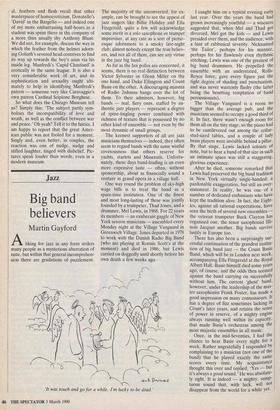Jazz
Big band believers
Martin Gayford
Aliking for jazz in any form strikes many people as a mysterious aberration of taste, but within that general incomprehen- sion there are gradations of puzzlement.
'It was touch and go for a while. I'm lucky to be dead.' The majority of the unconverted, for ex- ample, can be brought to see the appeal of jazz singers like Billie Holiday and Ella Fitzgerald; quite a few will acknowledge some merit in a solo saxophone or trumpet improviser, at any rate as a sort of pictur- esque adornment to a smoky late-night club; almost nobody except the true believ- ers, and not all of them, can see any virtue in the jazz big band.
As far as the hoi polloi are concerned, it seems, there is no real distinction between Victor Sylvester or Glenn Miller on the one hand, and Duke Ellington and Count Basle on the other. A discouraging miasma of Radio 2ishriess hangs over the lot of them. To their admirers, however, big bands — real, fiery ones, staffed by au- thentic jazz players — represent a degree of spine-tingling power combined with richness of texture that is possessed by no other kind of ensemble — not even by the most dynamic of small groups.
The keenest supporters of all are jazz musicians themselves indeed, they often seem to regard bands with the same wistful covetousness that others reserve for yachts, starlets and Maseratis. Unfortu- nately, these days band-leading is an even more expensive taste — often, without sponsorship, about as financially sound a venture as grand opera in a village hall.
One way round the problem of sky-high wage bills is to treat the band as a spare-time institution. One of the finest and most long-lasting of these was jointly founded by a trumpeter, Thad Jones, and a drummer, Mel Lewis, in 1968. For 22 years its members— an exuberant gaggle of New York session musicians — assembled every Monday night at the Village Vanguard in Greenwich Village. Jones departed in 1978 to work with the Danish Radio Big Band (who are playing at Ronnie Scott's at the moment) and died in 1986; but Lewis carried on doggedly until shortly before his own death a few weeks ago.
I caught him on a typical evening early last year. Over the years the band had grown increasingly youthful — a wiseacre suggested that, when Mel and Thad got divorced, Mel got the kids — and Lewis presided over them, and the audience, with a hint of rabbinical severity. Nicknamed `the Tailor', perhaps for his manner, perhaps for his flawlessly even rhythmic stitching, Lewis was one of the greatest of big band drummers. He propelled the ensemble with an understated, Rolls- Royce force, gave every figure just the right degree of shading and punctuation, and was never wantonly flashy (the latter being the besetting temptation of band percussionists).
The Village Vanguard is a room no bigger than the average pub, and the musicians seemed to occupy a good third of it. In fact, there wasn't enough room for them all on the tiny stage, so the piano had to be cantilevered out among the collar- stud-sized tables, and a couple of lady brass players were invisible behind a pillar. By that stage, Lewis lacked soloists of note, but to hear a band of that size in such an intimate space was still a staggering, glorious experience.
After he died, someone remarked that Lewis had preserved the big band tradition in New York virtually single-handed: a pardonable exaggeration, but still an over- statement. In reality, he was one of a number of dedicated enthusiasts who have kept the tradition alive. In fact, the Eight- ies, against all rational expectations, have seen the birth of several new ensembles — the veteran trumpeter Buck Clayton has organised one, the tenor saxophonist Illi- nois Jacquet another. Big bands survive lustily in Europe too.
There has also been a surprisingly suc- cessful continuation of the grandest institu- tion of big band jazz — the Count Basie Band, which will be in London next week, accompanying Ella Fitzgerald at the Royal Albert Hall. Basie himself died some years ago, of course, and the odds then seemed against the band carrying on successfullY without him. The current 'ghost' band, however, under the leadership of the mas- ter saxophonist Frank Foster, has made a good impression on many connoisseurs. It has a degree of fizz sometimes lacking in Count's later years, and retains the Sense of power in reserve, of a mighty engine always running well within its capacity, that made Basic's orchestras among the most majestic ensembles in all music. Once, in the mid-Seventies, I had the chance to hear Basie every night for a week. Rather ungratefully I responded by complaining to a musician (not One of the band) that he played exactly the same scores every time. My acquaintance thought this over and replied, 'Yes — but it's always a good sound.' He was absolute- ly right. It is indeed — a mighty, sump- tuous Sound that, with luck, will not disappear from the world for a while yet.


























































 Previous page
Previous page